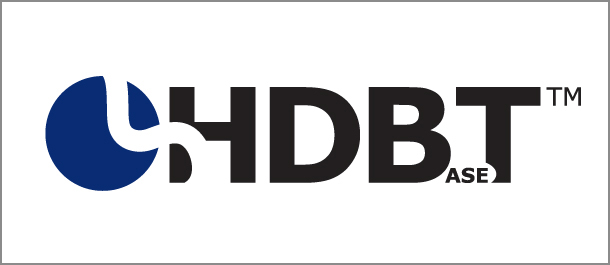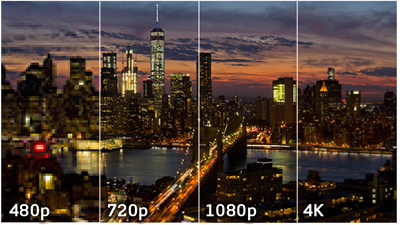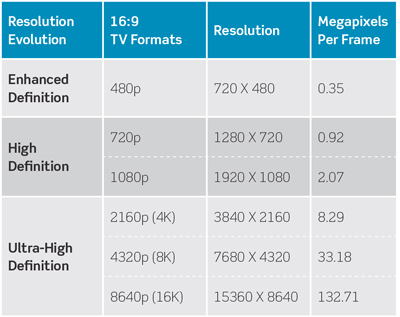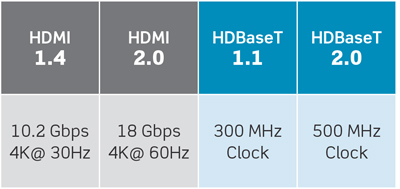Why HDBaseT Requires Cat 6A

HDBaseT continues to grow in adoption and industry recognition, and InfoComm 2016, the largest AV tradeshow in North America, displayed a widespread acceptance of this technology. HDBaseT can now be found in switches, extenders, displays, projectors, and a wide array of other AV devices. It is important that both AV and datacom design professionals understand best practices for the successful implementation.
Reliable deployment of HDBaseT requires Cat 6A cabling, but questions and inaccurate information still persist across the industry. Of attendees and vendors informally asked at InfoComm 2016, we found:
- 45% said, "any Cat 5 will do"
- 35% said, "I have to use a vendor specific or supplied cable or my warranty is void"
- 20% said, "10G cabling or Cat 6A"
HDMI vs HDBaseT
HDMI® was developed as a consumer-based connector and protocol that has since morphed into a standard connection method for most AV devices. Unfortunately, HDMI is only a local patching connection and was never designed to transmit signals over distances greater than five meters. HDMI extension products initially consisted of large cables, amplifiers, and devices supporting multiple RJ-45 connectors, but these had many drawbacks.
HDBaseT was originally intended to run on RJ-45 terminated cable supporting uncompressed video, audio, IR, serial, and power; often referred to as 5Play™. It was designed to extend these signals using existing datacom infrastructure and practices. The design criteria required a chipset and protocol that mimicked Ethernet so it could run on universally accepted data cabling. For instance, the HDBaseT Class A standard of 100-meter cabling distance was not arbitrary. 100 meters is the max distance of a category-rated channel and was carried over to HDBaseT as a design standard.

Timing is Critical
HDBaseT first hit the market years after the initial design goals were laid out. Most of the industry relied on VGA or component video for high-resolution imaging and saw HDMI as a consumer solution for DVD at 480p. By the time the first HDBaseT products launched, 1080p was the new HD opportunity. 1080p has high-bandwidth requirements, but with some tweaking it can run over a Cat 5e cable. So the initial design goal of running 1080p over Cat 5e was still reasonable.

Today, UHD (4K, 2160p/30 4:2:0), with high-dynamic range (HDR) and extended color depth/pallet, is becoming the norm. 8K was in show booths at InfoComm 2016, and 16K is being discussed and tested.
Does 4K Change the Standard?
Datacom and AV professionals know the cost of installing cabling and the value of future-proofing. While Cat 5e may still be counted as acceptable for HDBaseT by some, the technology is changing. 4K is already a minimum standard for new designs. Cat 5e is not suitable for HDBaseT signaling at 1080p, much less 4K UHD. At 2160p/60 HDR, the bandwidth nearly doubles current 4K video.
Here are some facts and figures:

Current 2160p/30 hardware and content already has a potential bandwidth of 10.2 Gb/s. Products running HDMI® 2.0 have bandwidth capacity of 18 Gb/s.
What Cable Should You Use?
Fortunately, there are established long-test standards for datacom cabling we can leverage. TIA rules and requirements are strictly followed by top-tier cabling and connectivity manufacturers and installers. Use only high-quality infrastructure from known vendors. Each category of data cabling is described in detail by the TIA-568 series of standards. It is common for manufacturers to make frequency claims beyond values stated in the standard, but those claims should not be considered measurable or guaranteed. Each category has a testable limit as follows:
- Cat 5e – 100MHz
- Cat 6 – 250MHz
- Cat 6A – 500MHz
Since HDBaseT 1.0 products run a 300MHz clock and HDBaseT 2.0 products run a 500MHz clock, Cat 6A is the only cabling system capable of reliable transmission of HDBaseT signals.
Alien Crosstalk
Alien crosstalk (AXT) is the interference of similar signals on adjacent pairs in a multi-pair cable. Modern Ethernet signaling is comprised of four full-duplex signals, each on a pair within a category cable. AXT is the interference between two of more of these similar signals.
Category cable is comprised of four balanced twisted pairs of small-gauge copper wires and the twist rate varies from pair to pair in order to reduce internal crosstalk. Typical Cat 5e cable construction is 24-gauge, but it and can be as small as 26 gauge. Cat 6A is typically 23 gauge. In addition to the pair-twist rate differential, Ethernet hardware includes digital signal processing (DSP) systems to error check and reduce the effects of AXT.
AXT was not a problem until the advent of 10GBASE-T Ethernet. Signal frequencies in 10/100/1000BASE-T typically do not exceed 80MHz. However, 10G uses every bit of the 500MHz bandwidth available in Cat 6A to transmit high-rate data over 100 meters of small-gauge copper cable. Signal strength had to be increased in order to reliably travel the long distance. Higher signal strength brought higher electromagnetic interference (EMI), especially at the near (launch) end. This higher signal EMI is strong enough to radiate into adjacent cables. Since adjacent cables have the same twist rate, the coupling is strong. And, because connections on these adjacent cables were electrically separate, DSP systems could no longer clean up the mess. This results in AXT.
Cat 6A minimizes AXT by reducing coupling through tightening of the cable twists to create an air gap. This makes the cable larger in diameter or creates irregular shapes to hold adjacent similar pairs apart. Shielding also solves this problem without significantly increasing cable diameter, if properly grounded.
HDBaseT signals are structurally similar to 10GBASE-T in signal strength, type, and frequency, and AXT problems are similar. If more than one HDBaseT signal shares a pathway – such as in the same j-box, conduit, or tray – AXT is likely to occur. Since HDBaseT is a stream without forward-error correction or packet retransmission, the result of AXT is total signal loss.
Shielded Cable
Shielded cable can mitigate EMI and AXT. Shielded cabling has been used throughout the datacom and AV industries for many years across security, government, and similar environments in need of high-noise rejection. An installer considering shielded cabling must take into consideration the grounding and bonding requirements in a commercial environment.
Shielded cable uses a foil or braided shield to capture EMI. The captured noise travels down the shield to a ground point where it is conducted to ground. The ground for all shielded cables also serves a safety function and must be grounded. All datacom applications terminate in a TR onto a grounded patch panel per TIA-607. However, HDBaseT is a point-to-point system that does not connect to a patch panel. This means shielded cables are typically left floating and therefore act as an antenna. Shielded cabling should not be used unless properly grounded for performance and safety.
Other Category Ratings
The only approved standards in the U.S. are Cat 5e, Cat 6, and Cat 6A. All others are sales and marketing terms created to give the impression of a better solution. Products with high-frequency claims should be viewed skeptically and must be tested after installation to ensure performance. Qualified field-test instruments are widely deployed in the datacom industry to ensure compliant cabling installations. These field instruments are designed to test and certify cabling infrastructure. Top-tier vendors mandate field certification of all cabling installation to ensure optimum performance, and require test reports of all installed links to qualify for long-term warranties.
Cat 8
Cat 8 is designed for data centers running 40 Gb/s up to a maximum distance of 30 meters. This cabling system is not intended for enterprise or HDBaseT applications, but could perform in those environments.
Fiber
Fiber optics are suitable and scalable for extremely high-resolution video and related content. HDBaseT 2.0 devices offer a fiber option that could be the next horizon for AV cabling. However, the improved performance of H.265 and other compression algorithms will keep the bandwidth and cost of higher resolution imaging within reach of Cat 6A for at least five more years.
The primary driver for continued use of copper cabling is cost. The cost of replacing miles of infrastructure is prohibitively expensive. For more than 20 years it's been said throughout the industry that fiber will replace copper within five years. However, copper is still the dominant cabling choice in enterprise installations because:
- It is low cost
- Electronics compatibility is assured due to the ubiquitous nature of the RJ45 connector
- Power can be delivered along with high-frequency signals
- The vast majority of installed enterprise LAN cabling is copper
Repurposing Existing Cable
It is possible to repurpose existing category-rated cabling for HDBaseT, especially in the case of retrofits. However, category cabling has a distance limitation of 100 meters. This means 100 meters total from source transmitters and from the telecom room (TR) to the outlet and receiver. If the cabling length of the run is not documented, a field-test instrument should be used to determine the cable run distance of both links. Add the lengths together. If the total is 90 meters or less, the links can be used for 100-meter HDBaseT. Patch cords that complete the link add to the total distance. Make sure not to exceed 100 meters.
Cable infrastructure is a large percentage of the total cost of installed AV.
Considering ever-increasing bandwidth requirements and higher resolution video images, installing minimally compliant cabling is a poor choice. Cat 5e is already swamped with 1080p/60 on HDBaseT. Cat 6 improvs the bandwidth by offering 2.5 times as much capacity, but 4K is asking 5 times as much from the cable. Cat 6A is the only choice for both HDBaseT and high-performance Ethernet signals.


